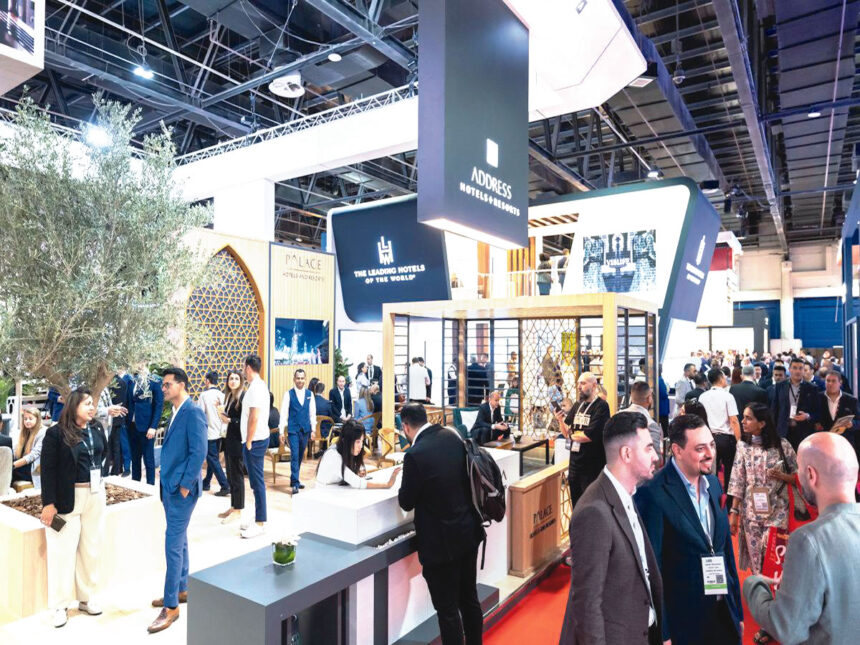•Luxury tourism industry to reach $391 billion by 2028
ARABIAN Travel Market (ATM) is set to highlight the thriving luxury tourism sector when it returns to the Dubai World Trade Centre from April 28 to May 28.
Bringing together top-tier hospitality brands, influential industry figures, and innovative travel destinations, the event will showcase the trends and insights that are shaping the high-end travel segment.
According to McKinsey and Company, demand for luxury tourism and hospitality is expected to grow faster than any other industry. This is predominantly due to the rising number of high-net-worth individuals globally and a growing segment of aspiring luxury travellers willing to allocate larger proportions of their income to premium experiences.
The research suggests that luxury tourism and hospitality will reach $391 billion by 2028, up from $239 billion in 2023, with Asia gaining significant ground in the market segment.
Supporting this trend, data recently issued by the Statistical Centre for the Cooperation Council for the Arab Countries of the Gulf revealed that GCC states earned $110.4 billion in international tourism revenues in 2023.
The largest share of tourists came from the Asia-Pacific region (38 percent), followed by the Middle East (25.1 percent), Europe (22.9 percent), Africa (8.8 percent), and the Americas (4.3 percent).
Danielle Curtis, Exhibition Director ME, Arabian Travel Markets, said: “The increase in inbound tourism from Asia and the growing wealth in this region create a major opportunity for Middle Eastern tourism, especially in the luxury sector.
“At ATM, Asia is among our fastest-growing markets for exhibitors, boasting a 27 percent increase in exhibitors from the region this year.
“National Tourism Organisations (NTOs) from destinations like Japan, Maldives, South Korea, India and Thailand are driving this growth, alongside regional tourist boards such as Rajasthan Tourism, Goa, Phuket, Hong Kong and Jakarta, all contributing to Asia’s expanding presence at ATM 2025 and the growing focus on luxury travel.”
The GCC region is ideally positioned to cater to high-net-worth travellers seeking leading hotels and exclusive experiences. To meet rising demand, GCC countries are on track to add 400,000 hotel rooms by 2030, following the addition of 35,000 rooms in the last decade.
ATM 2025 will feature some of the world’s top-rated luxury destinations, such as the Maldives and Mauritius, as well as Peru, which will return to ATM after 10 years. Visitors will be able to discover the country’s luxury offerings, including glamping in the Ica Desert and the Sacred Valley, luxury Amazon cruises, and train journeys across the Andes, where breathtaking landscapes meet world-class service.
Several prestigious hospitality brands will also be showcased, including Mandarin Oriental, Four Seasons Hotels & Resorts, Jumeirah International, One & Only, Kempinski Hotels, The Address Hotels & Resorts and The Leading Hotels of the World.
Luxury travel is transforming in terms of consumer preferences, with travellers increasingly prioritising luxury cultural, artistic, and adventure-driven experiences. Hospitality brands worldwide are adapting to meet this demand, while sustainability has become a key focus, particularly in the GCC, where hotels are implementing eco-friendly initiatives to align with the growing preference for responsible, high-end travel.
Improved accessibility is also reshaping luxury travel, with emerging destinations benefitting from improved connectivity and the development of boutique hotels, eco resorts and exclusive retreats. This trend is reflected in the theme for ATM 2025: Global Travel: Developing Tomorrow’s Tourism Through Enhanced Connectivity,” which focuses on how better connectivity enables a more sustainable, inclusive, and globally integrated travel industry.
The ATM 2025 Conference Programme will bring together top hospitality executives and luxury travel experts, who will share insights into the industry’s latest trends. Sessions include Generational Trends influencing Hyper-personalisation in Luxury led by the Department of Culture and Tourism—Abu Dhabi, Fairmont and Minor Hotels and Retaining High-Net-Worth Travellers by Redesigning Their Experience featuring speakers from Kempinski, Banyan Tree Holdings, GSIQ and Matter of Form.
ALSO READ FROM NIGERIAN TRIBUNE





